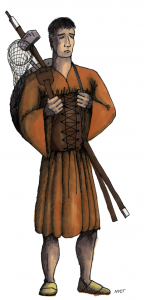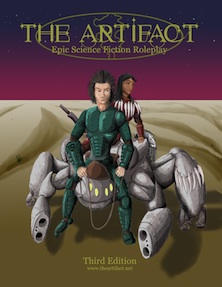 Because of my interest in games about wilderness survival I’ve thought about PCs being able to forage for food and water on and off. This doesn’t sound like a particularly exciting part of game play. “I’m gonna go look for plants.” Might not be as exciting as “We’re under attack!” but it’s something that a GM (or players) shouldn’t overlook. Being able to find food and water can be a very powerful skill. The PCs can travel further and faster if they don’t have to carry all their consumables with them. I’m not advocating spending a lot of time in game dealing with foraging. That would probably be as much fun as having to describe chewing the food you just found. Usually a simple skill check is what you want to use to show that effort was put into the activity. (Although foraging can be a great excuse to introduce a lot of fun story ideas. “Look a cave!”)
Because of my interest in games about wilderness survival I’ve thought about PCs being able to forage for food and water on and off. This doesn’t sound like a particularly exciting part of game play. “I’m gonna go look for plants.” Might not be as exciting as “We’re under attack!” but it’s something that a GM (or players) shouldn’t overlook. Being able to find food and water can be a very powerful skill. The PCs can travel further and faster if they don’t have to carry all their consumables with them. I’m not advocating spending a lot of time in game dealing with foraging. That would probably be as much fun as having to describe chewing the food you just found. Usually a simple skill check is what you want to use to show that effort was put into the activity. (Although foraging can be a great excuse to introduce a lot of fun story ideas. “Look a cave!”)
The question I’ve always wondered was, how much food could a character be expected to collect and how much time would it take? Would this be an all day affair just to get a few twigs and berries or could a player expect to take care of all their needs. I came off with a very dim view of foraging after watching a show called Survivorman, Les Stroud would be dropped in a remote location and would have to survive for three days all while hauling a bunch of camera equipment. Poor Les would find some water to drink, if he was lucky he would find a few bugs or a mouse to eat. He was usually dehydrated and starving at the end of the show. Added to this, it seemed like Les was reasonably well equipped with information about his environment. He would consult local experts on how to live off the land and would deliver an array of statistics about the fate of poor uninformed souls that got lost or died in the environment he was in.
The problem with using Survivorman as a model is that Mr Stroud was purposely picking the most difficult environments to survive in and at best would have to be considered a novice forager. He was good at finding water but when it came to getting food he knew what to look for but you could tell that he wasn’t practiced at it. It was almost always the first time he had attempted a technique.
An accomplished forager does much better, in hunter-gatherer societies 60% of the population is in the business of acquiring food and they work only around 15 hours a week to do so. In other words, in nine hours a week a skilled hunter-gatherer could supply himself with food for the week. On average, in one hour and seventeen minutes, a forager could get a day’s food (or one meal for three people). Most people take that long to get a fire going and set up a tent.
The challenge to this is that you’d expect that to only work in verdant forests and lush healthy landscapes but that hour and seventeen minutes comes from present day hunter-gatherers that live in locations like the Kalahari dessert or the ice pack of the north pole. Obviously some environments are more difficult to forage in than others but it would seem that in most situations survival by foraging is an issue of skill. In a rich environment, poor quality food is often passed up for better tasting food instead of people taking less time to forage.
In harsher environments the PCs will have to travel further to find food, something on the range of 2-20 km (so 3d6 km?) a half day’s travel on the far end. When they do find it, there would only be enough to sustain them for a few meals. So instead of foraging slowing down travel, travel makes more foraging possible. In a rich environment a single square kilometer can sustain up to 11 people for extended periods of time.
I should qualify that these statistics are for hunting and gathering but the gathering (or foraging) end of it usually accounted for 60-80% of the food in harsh environments.
I’m going to try and incorporate this in some of my Survival Games posts since I’ll be doing some more environments soon.


 The Free RPG Blog
The Free RPG Blog
Pingback: Survival Games – Food Theory | The Artifact RPG